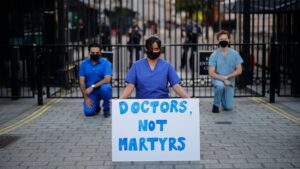Nothing about the National Health Service makes sense. As an institution, it provokes intense appreciation, and just as intense irritation and criticism. My own feelings about it oscillate between gratitude and fury. It’s our national shame, and the envy of the world. It’s over-managed but under-managed; too expensive but not expensive enough; too safety-obsessed and not concerned enough with safety. Just this week, the NHS was reportedly “on its knees”, threatened by a proposed plan to clamp down on overseas workers in order to cut immigration — while also celebrating its 75th birthday with cake and bingo, courtesy of the King and Queen. It’s a fitting note for an institution that has spent its three-quarters of a century simultaneously perceived as in permacrisis, and also as the unassailable heart of the British post-war consensus.
“Our NHS” looms so large in our politics as to wholly justify the sardonic description of Britain as “a health service with a country attached”. And while this outsize place in the national consciousness is sometimes mocked and often puzzling, it was inevitable from its very birth. For the origin-story of the NHS contains, in germinal form, a great deal of what makes up quintessentially modern Britain. Its formation was first demanded by, and in turn helped to catalyse, what conservatives now call the “Blob”: that unaccountable ecosystem of agencies, largely state-funded and amorphously affiliated, that replaced more voluntaristic forms of civil society. It was powered by the cultural shift toward centralisation and managerialism that blossomed during the Second World War and that’s still with us today.
Crucially, baked into the origin-story of Our NHS is modern Britain’s defining feature: a desire to have our cake and eat it. This desire, by no means unique to former PM Boris Johnson, finds complicated expression in the NHS: in the global standing supposedly conferred on Britain by this institution, the opportunity it offers to display national magnanimity — and also in what its foundation and upkeep cost us in real, geopolitical hard power.
If you were to take at face value the omnipresent warnings about Tory eagerness to “dismantle the NHS”, you would think there was no healthcare at all prior to Bevan. But pre-war British health provision was a long way from non-existent — it was just decentralised. Provision was split between three main groups: voluntary hospitals, “Poor Law” institutions and local authorities.
In 1938, some 33% of hospital beds were in voluntary hospitals: a mix of charitable foundations, such as Guy’s in London and Addenbrooke’s in Cambridge, and provincial “cottage hospitals” usually run by GPs and funded by charity donations and subscription societies. Another 20% of beds in 1938 were in “Poor Law” institutions, which originated in the spartan 19th-century workhouse system, immortalised in Dickens’ Oliver Twist. Many such institutions began as workhouse infirmaries and provided most of the beds for long-term inpatients, such as the very old or chronically ill. And the remainder of hospitals, some 47%, were run by local authorities, who were responsible for maternity, dental, school health and child welfare services, sanatoria and mental hospitals. Funding for this mix was collected via some local authority taxation, supplemented by churches, charities, private subscription and mutual societies — light state intervention supplemented by charitable giving and mutual aid, and supported by civil society voluntarism and mutual support.
Enter the Blob. Even before the Second World War, a germinal Blob already existed as an emerging force in British public life, typified by the Political and Economic Planning think tank. This strikingly proto-Blairite vehicle in funding, demographics and sensibility was crewed by just the kind of figures that make up the modern chumocracy, including financiers, social reformers and company directors. It was funded by big business and already had its eye on health, calling for British provision to be transformed so as to be centred on individuals rather than institutions.
This blend of financial interests, technocracy and do-gooding has been hacking away at the eccentric pre-existing thickets of organic civil society for decades now, with tacit or overt state support. But perhaps the single most salient moment in its formalisation as a serious force in British public life was the Second World War. During these six years of emergency collectivism, any meaningful barrier between private, voluntarist and state effort collapsed into a single national war effort; and nowhere were its results more pronounced than in British healthcare. By 1938, Britain was expecting a war and, in preparation, the Ministry of Health formed a regionalised Emergency Hospital Service to coordinate care for injured servicepeople and air-raid victims. It took some months of negotiation to persuade the voluntary hospitals to participate. But once their assent was secured, all worked together during the war.
And this Emergency Health Service, in turn, laid the managerial foundations for the National Health Service, for example by centralising data-gathering, performance standards and pay scales. And in the aftermath of war, Attlee’s Labour government seized the opportunity provided by those foundations. For as medical historian Nick Hayes shows, even before the war, Left-wing activists disliked the hodgepodge of charities and contributory schemes which funded healthcare schemes for the working class. Aneurin Bevan even denounced the “indignity” of nurses collecting money for charitable hospitals.
In 1945, a Labour government, including Bevan, took Parliament in a landslide. The party’s manifesto promised to revolutionise British healthcare. No more subscriptions or tin-rattling: instead, care would be free at the point of use, universal, available based on need and paid for out of general taxation. To watch the doctor-activists today, you might think they had all always been in favour. But at the time, there was stiff resistance. Voluntary hospitals defended their local links, while doctors objected to being paid a salary by the state. Some, like my grandparents (both doctors), emigrated instead of joining the new service. Many only agreed to work in the new system, when Bevan, as Health Secretary, conceded that consultants could see private as well as NHS patients. Similarly, the still-extant status of GP surgeries as private businesses contracted by the NHS was originally a Bevan compromise.
He is reported to have said of these objectors that he “stuffed their mouths with gold”. But with Britain impoverished by the war effort, where did he get the gold? And this is the final piece in the untold story of how our NHS made post-war Britain. For the compromises Bevan made to create the new Britain also played a central part in unmaking the Britain that was there before. Attlee’s government took power with grand plans to create a new welfare state for British citizens. To fund it, Attlee asked for a loan from the United States — only to find US President Harry Truman used that request as an opportunity to force concessions on the British presence and power in the Middle East, and with it any British ability to profit from the region’s oil wells.
Bevan felt obliged to downplay British interests in the Middle East in 1947, as historian James Barr shows, in part to ensure enough American goodwill to secure the $3.75 billion loan (around $63 billion in today’s currency) Labour needed to found its promised welfare state. Nor would this be the last time that, as Barr puts it, “Empire would be sacrificed for welfare”. In 1964, with a majority of only four seats, Harold Wilson cut defence spending by 16% in favour of welfare — a move that eventually resulted in British withdrawal from projecting hard power “East of Suez”. In effect, Attlee’s government began a long post-war trajectory of selling off Britain’s surviving geopolitical reach, piece by piece. In exchange, Bevan got a health service Britain couldn’t afford even when it was founded.
So let’s both have, and eat, another slice of 75th birthday cake. Our NHS has always been powered by cakeism. By the hope we could have services regulated, funded and managed nationally but somehow still locally connected. That we could have consultants willing to participate in a relatively low-paying national system, in exchange for the freedom to work privately, too. That we could, somehow, continue to “punch above our weight” internationally and also domestically, trading away the meaningful geopolitical foundations of Britain’s one-time international reach in exchange for the money to create state-run healthcare provision at levels well above what we can sustainably support.
In this sense, the NHS really is a miracle. It shouldn’t have been possible, and yet somehow we’ve kept this extraordinary experiment in post-war collectivism on life support for 75 years, while keeping up appearances (at least among ourselves) of still being a grand power “on the international stage”. We achieved this by slowly cannibalising what was left of Britain’s pre-war international reach. And with this now exhausted, we’ve resorted to inverting that foreign adventurism, and inviting our own reverse colonisation by anyone who wants to move to Britain and make the economy look like it’s still growing (and/or make the NHS look like it’s still functioning). Nor is there any way out of this policy bind, either on the Left or the Right: Britain really doesn’t train enough healthcare workers, and we really are dependent on immigration for growth, and on growth to fund the NHS.
I’m agnostic on whether we’d be better off keeping nationalised healthcare as opposed to some other funding model. But at the national level, the popularity of NHS cakeism is such that very little is likely to change, until change can’t be avoided. Notwithstanding Left-wing doomers, the only way the NHS will ever be “dismantled” will be as the logical endpoint of measures taken to keep it alive. That is, when the ongoing (and partly NHS-driven) transformation of our citizenry has so diluted the memory of the wartime social solidarity that inspired its birth, that we no longer have the political will to keep the patient alive.
Disclaimer
Some of the posts we share are controversial and we do not necessarily agree with them in the whole extend. Sometimes we agree with the content or part of it but we do not agree with the narration or language. Nevertheless we find them somehow interesting, valuable and/or informative or we share them, because we strongly believe in freedom of speech, free press and journalism. We strongly encourage you to have a critical approach to all the content, do your own research and analysis to build your own opinion.
We would be glad to have your feedback.
Source: UnHerd Read the original article here: https://unherd.com/



